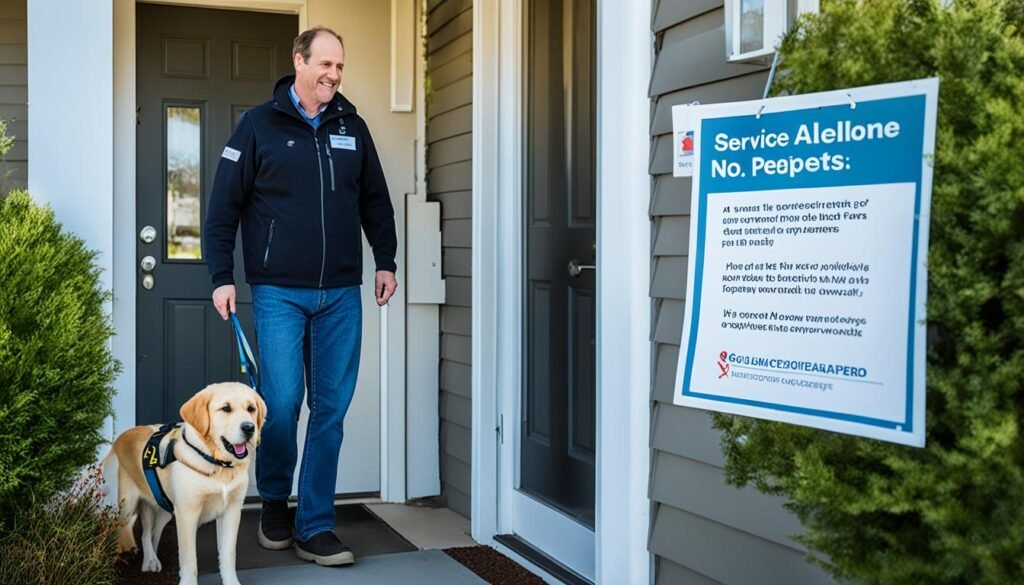Are you torn between allowing pets in your rental properties or sticking to a strict no-pets policy? The decision is not an easy one, but it could have a significant impact on your business. A recent report from YouGov has found that two-thirds of renters who would like to own a pet can’t because of their landlord, leading to loneliness and dissatisfaction with their tenancy. So, what’s the right approach? Should you open your doors to furry, feathered or scaly tenants, or is it better to keep them out?
There are some obvious drawbacks to allowing cats and dogs in your properties, but there are positives too, so it’s about finding the balance. Data shows that almost half of all renters have a pet, so if you limit your properties to non-pet owners, you’ve got a smaller pool of people to choose from, meaning your home could be on the market for much longer – or fail to be let.
Key Takeaways
- Two-thirds of renters who want a pet can’t get one due to landlord restrictions
- Almost half of all renters have a pet, so limiting to non-pet owners reduces your tenant pool
- Allowing pets has pros and cons, so it’s about finding the right balance
- Careful tenant screening and clear pet policies are key to success
- Service animals must be accommodated under fair housing laws
The Pros and Cons of Allowing Pets in Your Rental Properties
As a landlord, deciding on a pet policy can be tough. There are some obvious drawbacks to allowing cats and dogs in your properties, but there are positives, too, so it’s about finding the balance. Homebox UK has rounded up the pros and cons to give you some food for thought. The truth is, there is no right or wrong answer when it comes to accepting pets. Use your discretion and consider accepting pets on a case-by-case basis. If you know a tenant is clean and professional, you’ll find it easier to say yes. And for those with leasehold properties, you’ll also need to consult any property management company before agreeing.
| Pros | Cons |
|---|---|
|
“The truth is, there is no right or wrong answer when it comes to accepting pets. Use your discretion and consider accepting pets on a case-by-case basis.”
Longer Tenancy and Increased Loyalty
Pet owners are more likely to sign long-term tenancy agreements once they’ve found a property they – and their pooch – feel at home in. Why? Many landlords don’t allow pets, so if they’re satisfied, they’ll be more loyal than others. The Balance points out that it can be harder for pet owners to find alternate dwellings that will take both them and their pet. Settling in with a pet can make a rental feel like a permanent residence.
Pet Owners’ Reluctance to Move
The Balance highlights that it can be harder for pet owners to find alternate dwellings that will take both them and their pet. This reluctance to move can translate into longer tenancy agreements, as pet-owning tenants are more inclined to stay put in a property they and their furry friend feel comfortable in.
Fostering a Sense of Home
Allowing pets in your rental properties can help tenants feel a stronger sense of home. When pet owners are able to bring their companions with them, they’re more likely to view the property as a permanent residence rather than a temporary living arrangement. This can foster a heightened sense of care and responsibility towards maintaining the condition of your rental.
Higher Rental Income Potential
When it comes to renting out properties, the market value determines the amount you can set your rent. By allowing pets in rentals, especially when very few properties in your neighbourhood are pet-friendly, you may be able to command a higher rent. This is particularly true for larger dogs, which are in high demand but often face restrictions from landlords.
Pet-Friendly Properties in High Demand
At the very least, allowing pets in your rental property could give you a leg up on the competition if a decision comes down to your property and a similar one that doesn’t allow pets. With pet ownership in the UK at an all-time high, having a pet-friendly policy can make your property more attractive to a wider pool of prospective tenants.
Justification for Pet-Related Fees
While it’s important to be reasonable with pet-related fees, Homebox UK states that adding a cleaning fee to the end of a tenant’s tenancy is perfectly acceptable. However, charging an extra £150 per month for a tenant with a dog is likely not justified and may deter potential pet-owning renters.
Wider Pool of Prospective Tenants
Pet ownership in the United Kingdom is at an all-time high. According to the 2017-2018 APPA National Pet Owners Survey, 68% of U.K. households own a pet. If your rental property is marketed towards a younger market, there’s an even higher likelihood that a pet is part of the package. Zillow reports that over 76% of millennial renters own pets. Allowing pet policies for rentals and pet-friendly housing attracts more tenants to your property and gives you more tenant pet guidelines to choose from, so you can find the best fit.
By embracing landlord pet rules, you’re opening your doors to a wider pool of pet deposits for rentals and pet fees for apartments. This not only increases the number of potential tenants, but also allows you to be more selective in finding the right tenant who will treat your property with the same care and attention they give their beloved pet damage in rentals.
Responsible Pet Owners as Responsible Tenants
Rentalutions points out that taking care of a pet requires a lot of time and attention, and there’s a likelihood that this behaviour will translate into renters treating your property with the same amount of respect and energy. Responsible pet owners are more likely to be responsible tenants. Caring for a pet demonstrates the level of commitment and attention to detail that can translate into how they maintain your rental property.
Time and Attention Required for Pet Care
Looking after a pet necessitates a significant investment of time and attention. This level of dedication can have a positive impact on how tenants treat your pet-friendly housing. Tenants who are diligent in meeting their pet’s needs are often equally meticulous when it comes to respecting your landlord pet rules and tenant pet guidelines.
Respect for Property as an Extension of Pet Care
Tenants who take excellent care of their pets are more likely to extend that same level of respect and consideration to your rental property. They understand the importance of maintaining a clean, well-kept environment, not just for their own benefit, but also to prevent pet damage in rentals. This mindset can lead to a heightened sense of responsibility and a greater appreciation for the property they call home.
Potential Risks: Damage and Disturbances
Pets aren’t as civilised as humans. Expect scratched floorboards, chewed skirting boards, accidents on your expensive carpet and urine damage to your grass. Even the cutest pets in the world are a little smelly. Accidents can’t be avoided and the right cleaning products can rectify the occasional wee, but if you accept tenants who don’t look after their animals or your property, they could cause thousands of pounds worth of pet damage in rentals.
Chewing, Scratching, and Accidents
Pets, especially dogs and cats, can be prone to destructive behaviours like chewing and scratching. This can lead to costly damages to the property’s fixtures and fittings. Additionally, pet accidents on carpets, floors, or furniture can create unpleasant odours and require professional cleaning or replacement.
Noise Complaints from Neighbours
Let’s face it: we all worry when a new neighbour moves in. Will they have a noisy dog? Will their cat do their business all over our new shrubs? Animals can disturb other tenants and your outside neighbours, leading to pet noise complaints that you’ll need to address as the landlord.
Odour Concerns
Even the most adorable pets can emit unpleasant odours. While the occasional accident is unavoidable, landlords must be cautious about accepting tenants who fail to properly maintain their animals or the rental property. Neglected litter boxes and pet-related spills in common areas can lead to persistent, offensive smells that impact the living experience for all occupants.
Pet Accidents and Litter Box Maintenance
If litter boxes are not cleaned regularly or pet accidents occur in hallways or other shared spaces, foul odours can quickly build up and become a nuisance for the entire building. Tenants who do not responsibly clean up after their pets may risk damaging the property and disturbing their neighbours. Landlords should emphasise the importance of prompt clean-up and proper litter box upkeep in their pet policies for rentals and tenant pet guidelines.
Grooming and Bathing Considerations
Poorly groomed or infrequently bathed pets can also be a source of unpleasant odours within individual rental units. Landlords should encourage pet-friendly housing residents to maintain their animals’ hygiene to prevent lingering smells. Addressing landlord pet rules and pet damage in rentals associated with inadequate grooming is an important aspect of managing a successful pet-friendly housing community.

Tenant Screening and Pet Policies
Careful tenant screening of each applicant is your best bet at successfully handling pets on your property. Finding a good tenant is based on much more than whether or not they have a furry companion, and if they are responsible in other ways–such as managing their finances–pets may not pose a problem. You’ll want to see for yourself if the animal is well-groomed and well-behaved. In the case of a dog, you’ll be able to note if they are calm and responsive to the owner’s commands.
Assessing Responsibility as a Pet Owner
It’s important to decide if the property you are renting will allow pets or not and to be clear in a tenancy agreement to avoid confusion. By establishing clear guidelines and expectations upfront, you can ensure that your pet-owning tenants understand their responsibilities and will take proper care of your rental property.
Establishing Clear Guidelines and Expectations
Clear communication is key when it comes to pet policies in rental properties. Make sure to outline your expectations regarding pet behaviour, cleaning, and any associated fees or deposits. This will help create a harmonious living environment for both you and your tenants with pets.
Mitigating Risks with Pet Deposits and Fees
If you’re concerned about damage to your property, it would be wise to include a pet policy and address pets in the lease. Bankrate points out that tenants are more motivated to prevent pet-related damage if the fee is refundable. You’ll also want to check your state and local housing laws to see whether you can add an additional pet deposit and how much you are allowed to collect.
Refundable Deposits for Motivation
Refundable pet deposits can serve as an incentive for tenants to take good care of your property. When tenants know they can get their deposit back, they are more likely to be responsible pet owners and ensure their furry friends don’t cause any damage.
Professional Cleaning and Restoration Services
In addition to pet deposits, you may want to consider offering pet-friendly housing and charging pet fees to cover the cost of professional cleaning and restoration services at the end of a tenancy. This can help offset any potential damage caused by the tenant’s pet and ensure your property is in pristine condition for the next occupant.
You may want to order a Good Practice Pack to learn about how to become a pet-friendly landlord and access specialised insurance for a pet-friendly property.
Accommodating Service Animals
Landlords must be mindful of their legal obligations when it comes to service animals. Unlike regular pets, service animals are not subject to typical pet policies or fees, as they are considered necessary accommodations under the Fair Housing Act. This means that landlords must allow tenants with disabilities to have service animals without imposing any restrictions or additional costs.
Legal Obligations and Fair Housing Laws
The service animal laws for rentals in the United Kingdom dictate that landlords cannot refuse to rent to individuals with disabilities who require the assistance of a service animal. These animals are not considered pets, and landlords must make reasonable accommodations to ensure they are permitted on the property without any hindrance. Failing to do so could result in legal ramifications for violating fair housing laws.
Tenants with disabilities have the right to have their service animals accompany them in their rental homes, and landlords must comply with these regulations. This includes allowing the animals in common areas, waiving any pet fees or deposits, and not imposing breed or size restrictions that would prevent the tenant from having their necessary service animal.
| Key Considerations for Landlords | Guidance on Service Animal Laws |
|---|---|
| Reasonable Accommodations | Landlords must make reasonable accommodations to allow tenants with disabilities to have service animals, without imposing restrictions or additional costs. |
| Prohibited Discrimination | It is unlawful for landlords to refuse to rent to individuals with disabilities who require service animals or to charge them extra fees. |
| Verification of Need | Landlords can request documentation to verify that the tenant has a disability and the animal is necessary, but cannot require the animal to be certified or registered. |
By understanding and adhering to the service animal laws for rentals, landlords can ensure they are complying with fair housing regulations and providing accommodations for tenants with disabilities who rely on service animals. This helps create an inclusive and accessible rental environment for all.

Building a Rapport with Pet-Owning Tenants
Happy tenants are quieter and stick around for longer periods of time. If your tenants know they can bring their furry friend home with them, they’ll feel more at home, take pride in looking after your property, and be a courteous tenant. By allowing pets, you can build a rapport with your tenant and they are more likely to keep the property in good condition.
Working with pet-owning tenants and understanding their needs can create a positive and long-lasting rental relationship. When landlords demonstrate a pet-friendly approach and landlord pet rules that accommodate their tenants’ furry companions, it can foster a sense of trust and belonging. Tenant pet guidelines that are clear and reasonable help to set expectations and build a constructive dialogue.
Ultimately, being open to pet policies for rentals can attract a wider pool of prospective tenants, retain long-term renters, and cultivate a mutually beneficial landlord-tenant dynamic. By prioritising the needs of pet-friendly housing, landlords can strengthen their relationships with responsible pet owners and create a harmonious rental environment for all.




